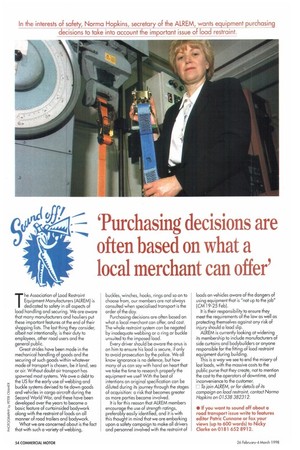In the interests of safety, Norma Hopkins, secretary of the
Page 56

If you've noticed an error in this article please click here to report it so we can fix it.
ALREM, wants equipment purchasing decision, to take into account the important issue of load restraint.
'Purchasing decisions are often based on what a local merchant can offer'
The Association of Load Restraint Equipment Manufacturers (ALREM) is dedicated to safety in all aspects of load handling and securing. We are aware that many manufacturers and hauliers put these important features at the end of their shopping lists. The last thing they consider, albeit not intentionally, is their duty to employees, other road users and the general public.
Great strides have been made in the mechanical handling of goods and the securing of such goods within whatever mode of transport is chosen, be it land, sea or air. Without doubt air transport has spawned most systems. We owe a debt to the US for the early use of webbing and buckle systems devised to tie down goods and vehicles in cargo aircraft during the Second World War, and these have been developed over the years to become a basic feature of curtainsided bodywork along with the restraint of loads on all manner of road trailers and bodywork. What we are concerned about is the Fact that with such a variety of webbing, buckles, winches, hooks, rings and so on to choose from, our members are not always consulted when specialised transport is the order of the day. Purchasing decisions are often based on what a local merchant can offer, and cost. The whole restraint system can be negated by inadequate webbing or a ring or buckle unsuited to the imposed load. Every driver should be aware the onus is on him to ensure his load is secure, if only to avoid prosecution by the police. We all know ignorance is no defence, but how many of us can say with hand on heart that we take the time to research properly the equipment we use? With the best of intentions an original specification can be diluted during its journey through the stages of acquisition: a risk that becomes greater as more parties become involved. It is for this reason that ALREM members encourage the use of strength ratings, preferably easily identified, and it is with this thought in mind that we are embarking upon a safety campaign to make all drivers and personnel involved with the restraint of loads on vehicles aware of the dangers of using equipment that is "not up to the job" (CM 19-25 Feb).
It is their responsibility to ensure they meet the requirements of the law as well as protecting themselves against any risk of injury should a load slip. ALREM is currently looking at widening its membership to include manufacturers of side curtains and bodybuilders or anyone responsible for the fitting of load restraint equipment during building. This is a way we see to end the misery of lost loads, with the massive costs to the public purse that they create, not to mention the cost to the operators of downtime, and inconvenience to the customer.
[ To join ALREM, or for details of its campaign on load restraint, contact Norma Hopkins on 01538 382372.
• If you want to sound off about a road transport issue write to features editor Patric Cunnane or fax your views (up to 600 words) to Nicky Clarke on 0181 652 8912.




















































































































